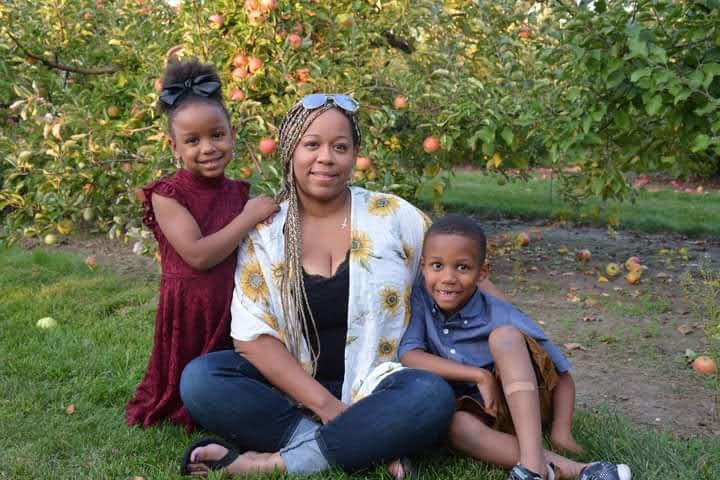Felecia’s Story
April 7, 2021

Felecia Parker is looking forward to purchasing a new home this year, and planning to put in a garden with her children.
She’s currently in the 21st year of her career as a medical assistant, overseeing remote learning for her 5- and 7-year-old, and actively searching for that new property with space for a garden. She’s been a homeowner for 14 years, and knows her way around managing a household budget.
Still, the single mother of four – with two kids at home, and two older children including one with special needs – has at times found it difficult to make ends meet. Child care alone is a huge expense for Parker, one that was unplanned and necessary thanks to the pandemic.
“I feel like I’m in limbo because I make too much to qualify for day care assistance or food stamps, but don’t make enough money to sustain all of that,” she said. “It’s like we get lost in the shuffle.”
The government’s response to COVID-19 also introduced some new dynamics when it enhanced unemployment benefits, leaving some essential workers feeling even further left behind.
“I try not to get bitter,” Parker said.
She’s far from alone.
ALICE Report Shows Families Still Struggling
The 2021 ALICE Report, released in March, shows that 39% of the region’s 157,023 households don’t earn enough to exceed the ALICE threshold – the income needed to be financially stable. ALICE stands for Asset Limited, Income Constrained, Employed. ALICE represents the growing number of households in communities nationwide that do not earn enough to afford household necessities – child care, food, transportation, internet, etc.
According to the new report, 26% of Calhoun County’s 53,827 households are ALICE, the same as in the 2019 report, while the percentage of households in poverty declined to 13% (vs. 19% in the 2019 report). In Kalamazoo County, the number of ALICE households decreased to 24% of 103,196 households (vs. 26% in the 2019 report), but the percentage of households in poverty rose to 15% (vs. 13% in the 2019 report.)
Many of these families and individuals find themselves living paycheck to paycheck, losing sleep over the knowledge that just one small crisis – a transportation issue, a health scare – could devastate their finances. Part of United Way’s work is to ensure that a community safety net is in place for those times when the worst happens.
“There’s times when I sit here and come up with a plan, and come up with a budget, and something happens,” Parker said.
A Safety Net and More
One of those “somethings” a few years back was the unexpected expense of a broken picture window.
Parker got in touch with Community Homeworks, a United Way funded partner that works to create stable and sustainable home environments. She was able to get the repairs done by attending classes that gave her credit toward those repairs and others, and gave her valuable skills.
“I learned how to fix toilets, create a raised garden, create a rain barrel,” Parker said. “And then they had one where you could go and learn how to use different power tools. I learned a lot from them, and it was good for just being a homeowner, but also good knowledge being a female. There’s not really places women can go to try to figure things out. I really appreciate what they did.”
Parker also has at times in her life turned to other organizations like Salvation Army and Loaves and Fishes – again part of that community safety net.
While critical for keeping ALICE households from sliding into poverty, a safety net alone won’t be enough to create the upward mobility needed to push more households above the ALICE threshold. That will take all of us – nonprofits, public officials, community members, employers – working together to create lasting change, said United Way Associate Director of Community Impact Laurel Clark.
ALICE are people working incredibly hard that have faced barriers every step of the way,” said Laurel Clark said. “It’s critical that we work together as a community to remove those barriers, to advocate for better policy, to address racial inequities that contribute to the issues, and to understand that ALICE is interwoven with the social and economic strength of our community. It’s vital that we realize that when ALICE succeeds, we all succeed.”
Learn more about the 2021 ALICE Report at www.changethestory.org/alice, and watch the virtual launch of the report here, featuring speakers including Mike Larson, President & CEO of the Michigan Association of United Ways and Gov. Gretchen Whitmer.
![]()
Posted in ALICE, BC/Kzoo, Success Stories
